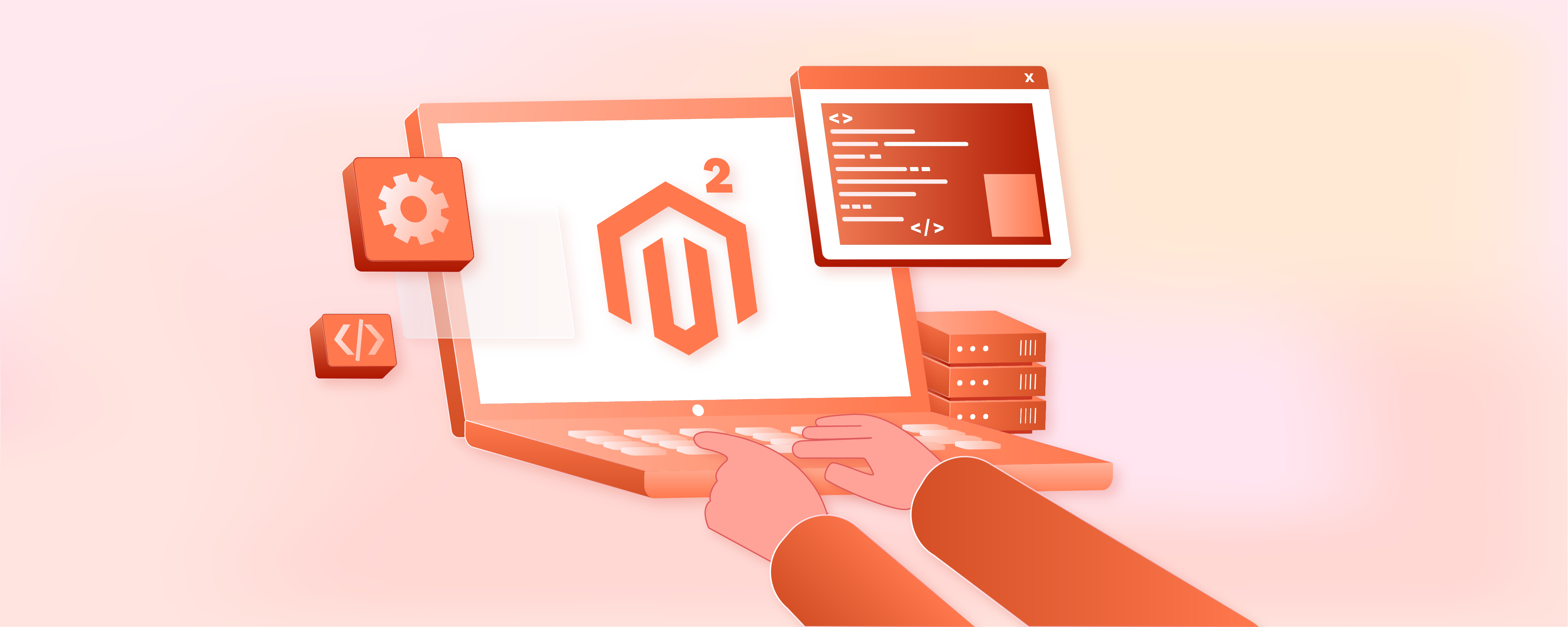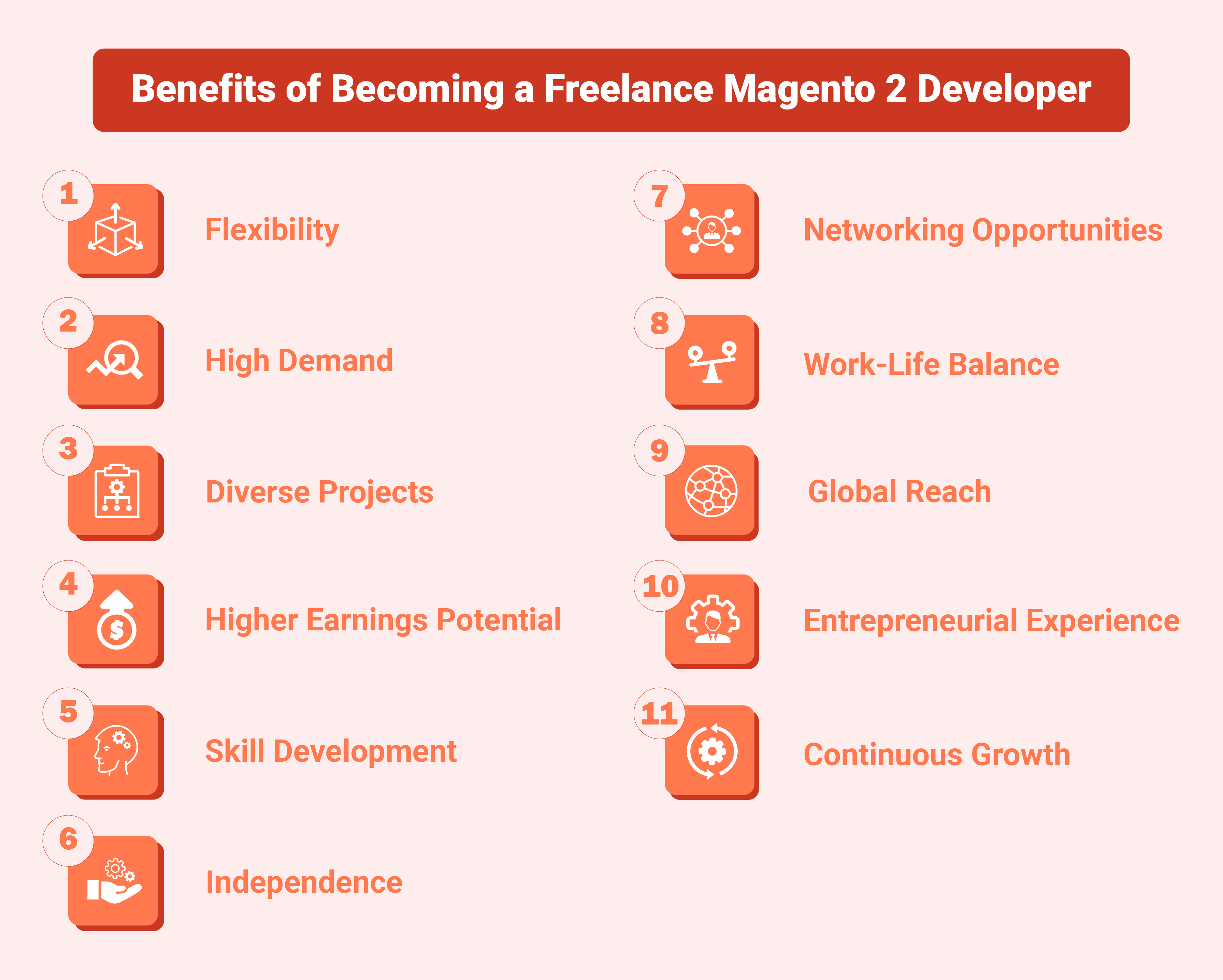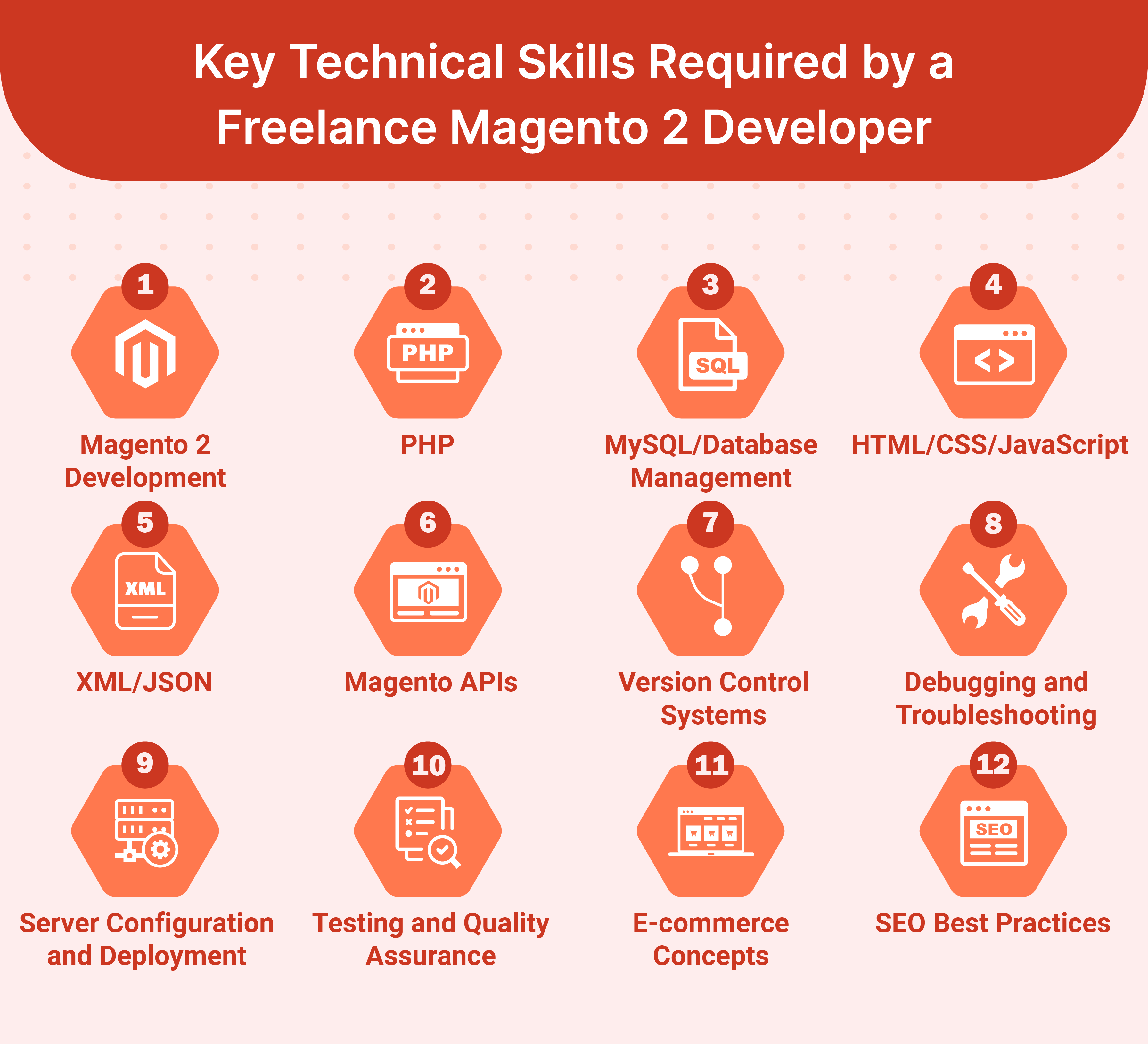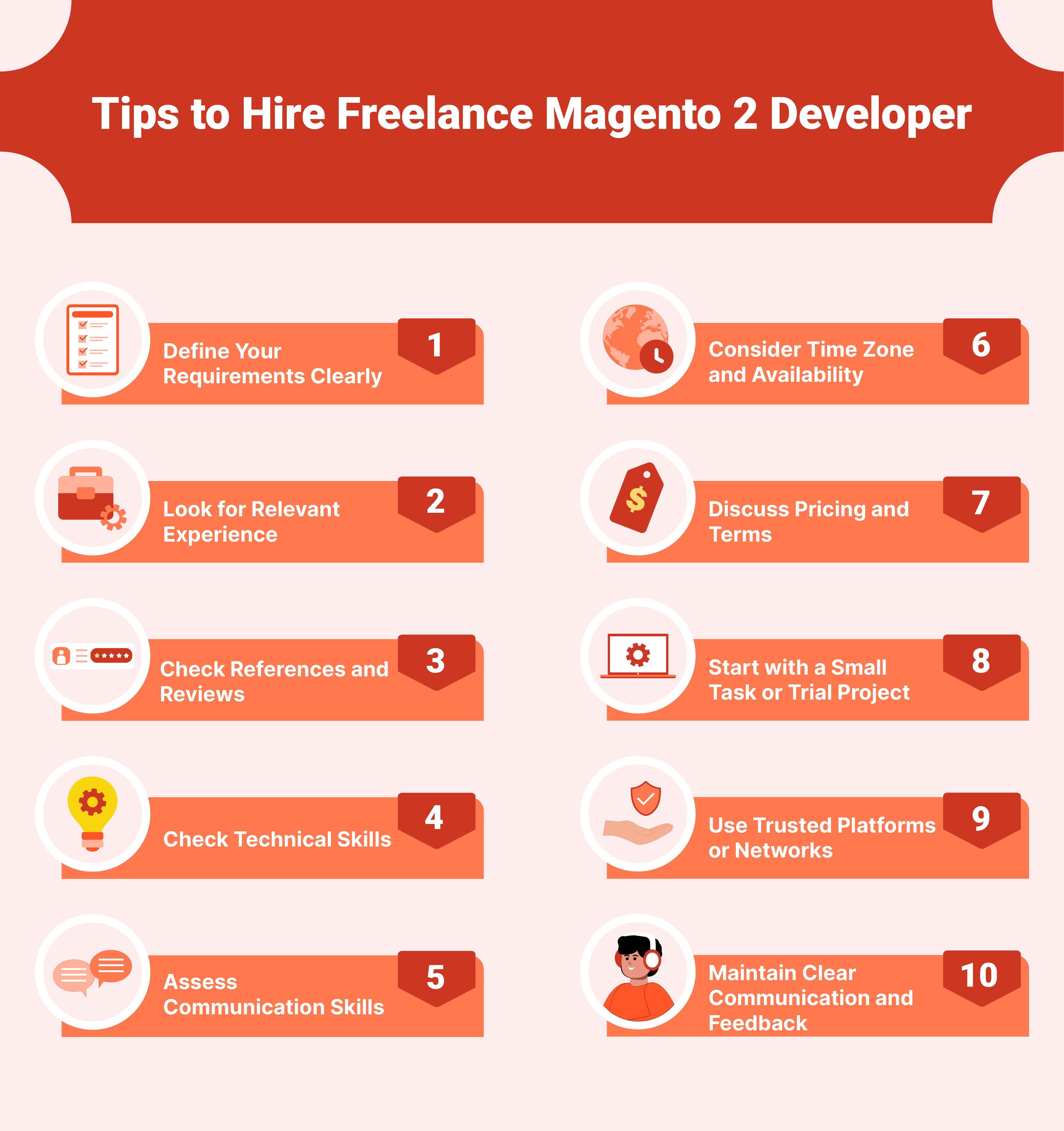
Freelance Magento 2 Developer vs. Magento Development Companies
Deciding between hiring a freelance Magento 2 developer or a development company? Freelance Magento 2 developers offer unparalleled flexibility and competitive rates.
In this article, we will discover the benefits and key considerations to make an informed choice.
Key Takeaways
-
Discover the benefits of being a freelance Magento 2 developer.
-
Learn about the steady demand for Magento 2 expertise and the diverse projects.
-
Understand the technical skills required by freelance Magento 2 developers.
-
Compare the differences between hiring a freelance developer and a development company.
-
Gain practical tips on how to hire and collaborate with a freelance Magento 2 developer effectively.
-
Key Technical Skills Required by a Freelance Magento 2 Developer
-
Common Problems and Setbacks with Freelance Magento 2 Developers
-
Difference Between Freelance Magento 2 Developer and Magento 2 Development Company
Benefits of Becoming a Freelance Magento 2 Developer

1. Flexibility
Freelance Magento developers have the freedom to set their schedules. They can also work from anywhere with an internet connection. The flexibility allows you to balance work with personal commitments or other projects.
2. High Demand
Magento 2 powers millions of online stores. As businesses increasingly move online, the demand for skilled web developers increases. The high demand translates into a steady flow of job opportunities for freelance developers.
3. Diverse Projects
Magento 2 is a widely used ecommerce website. There is a high demand for top Magento developers. Freelancers have the flexibility to choose from a variety of projects across different industries and client types. It keeps their work interesting and challenging.
4. Higher Earnings Potential
Freelancers often have the potential to earn more than traditional employees. This is due to their ability to set their rates and negotiate contracts directly with clients. You can increase your rates accordingly as you gain experience and develop a strong portfolio.
5. Skill Development
Working on freelance projects exposes you to different challenges and requirements. It can help you develop a broader skill set. You will constantly be learning and adapting to new technologies and methodologies to meet client needs.
6. Independence
Freelancing gives you the independence to choose the projects you want to work on. You can also choose the clients you want to collaborate with. You are not tied to the policies or culture of a specific company. It allows you to maintain control over your work and career direction.
7. Networking Opportunities
Engaging in freelance work exposes you to a wide network of:
-
Clients
-
Fellow developers
-
Professionals in related fields.
Building strong relationships within this network can lead to:
-
Future opportunities
-
Referrals
-
Collaborations.
8. Work-Life Balance
Freelancing can sometimes involve long hours or tight deadlines. It also offers the potential for a better work-life balance. You have more control over your workload. You can also prioritize time for personal pursuits, hobbies, and family.
9. Global Reach
The nature of freelance work often crosses geographical boundaries. It allows you to work with clients from around the world. It expands your client base. It also exposes you to diverse cultures and perspectives.
10. Entrepreneurial Experience
Freelancing requires you to manage various aspects of your online business, including:
-
Finances
-
Client relations.
The experience can be valuable if you ever decide to start your development agency or pursue other ventures.
11. Continuous Growth
Technology is rapidly evolving. There is always something new to learn and explore in the world of Magento 2 development. Freelancing allows you to stay at the forefront of industry trends and innovations. It ensures continuous personal and professional growth.
Key Technical Skills Required by a Freelance Magento 2 Developer

1. Magento 2 Development
Mastery of Magento 2 is essential. It includes understanding its:
-
Customization capabilities
-
Best practices for development.
This includes proficiency in:
-
Theme development and customization
-
Module development
-
Integration with third-party extensions and services
-
Performance optimization
-
Security best practices.
2. PHP
Magento is built on PHP. It requires a strong understanding of PHP programming. It includes knowledge of:
-
Object-oriented programming (OOP) principles
-
PHP frameworks
-
Familiarity with Magento's PHP-based coding standards.
3. MySQL/Database Management
Magento relies on MySQL for data storage and management. Magento development requires a solid understanding of database concepts, including:
-
Table relationships
-
Indexing
-
Optimization techniques.
4. HTML/CSS/JavaScript
Proficiency in front-end technologies such as HTML, CSS, and JavaScript helps in:
-
Customizing Magento themes
-
Designing user interfaces
-
Implementing interactive features.
5. XML/JSON
Magento uses XML and JSON extensively for:
-
Data exchange
-
API integrations.
Magento development needs an understanding of how to work with these formats.
6. Magento APIs
They should be familiar with Magento's API architecture and capabilities. It helps integrate Magento with external systems, such as:
-
Shipping carriers
-
ERP systems.
7. Version Control Systems
Experience with version control systems like Git helps in:
-
Managing code changes
-
Collaborating with other best freelance Magento developers
-
Maintaining a clean and organized codebase.
8. Debugging and Troubleshooting
Strong problem-solving skills help identify and resolve issues in mobile apps. Efficient development requires familiarity with:
-
Error logging mechanisms
9. Server Configuration and Deployment
Deploying Magento applications successfully requires an understanding of:
-
Server configurations
-
Hosting environments
-
Deployment processes.
They should also know server technologies such as:
-
Apache
-
Nginx
10. Testing and Quality Assurance
They should be experienced with testing methodologies, including:
-
Unit testing
-
Integration testing
-
End-to-end testing.
These help ensure the quality and reliability of Magento applications. Familiarity with testing frameworks and tools can streamline the testing process.
11. E-commerce Concepts
Developing effective Magento solutions helps meet client requirements. They need a good understanding of Magento ecommerce principles, including:
-
Product management
-
Shopping cart functionality
-
Checkout processes
12. SEO Best Practices
They should know about SEO best practices and techniques. These optimize Magento websites for search engines. These help improve visibility and drive organic traffic to Magento stores.
Common Problems and Setbacks with Freelance Magento 2 Developers
1. Quality of Work
Freelancers may vary significantly in their expertise and experience with Magento 2. It can lead to inconsistent quality of work. The absence of a standardized development process or quality assurance steps that development companies have can increase this issue.
2. Communication Issues

Time zone differences and language barriers can make effective communication challenging. It might lead to misunderstandings regarding project requirements or delays in feedback and revisions.
3. Project Management
Managing a freelance developer requires more hands-on oversight from the client side. Project timelines and deliverables might not be as structured or adhered to. It leads to potential project delays.
4. Security and Best Practices

Freelancers might not always follow best practices for security. It is essential for an eCommerce platform that handles sensitive customer data. The oversight can expose your business to vulnerabilities.
5. Scalability and Maintenance
A single freelancer might not be able to handle the scaling requirements of the site, including:
-
Integrating new features
-
Handling increased traffic
-
Managing more complex back-end operations.
6. Dependency
Over-reliance on a single freelancer can be risky. They might become unavailable due to personal reasons or if they decide to drop the project. It can leave the business in a difficult position.
7. Hidden Costs

Hiring a freelancer can seem cost-effective initially. Hidden costs can arise due to:
-
Extended timelines
-
Need for additional resources
-
Fixing issues that stem from poor initial development.
Difference Between Freelance Magento 2 Developer and Magento 2 Development Company
| Criteria | Magento 2 Development Company | Freelance Magento 2 Developer |
|---|---|---|
| Expertise and Specialization | Teams with diverse roles. It includes UX/UI designers, backend and frontend developers, QA engineers, and project managers. They can handle complex, comprehensive projects efficiently. | Typically specializes in specific areas. It includes theme customization or module development. Ideal for niche requirements. |
| Resource Availability | Can dedicate multiple professionals to manage and execute large projects. It offers flexibility and fast turnarounds. | Works independently. It might limit their ability to take on large projects or tasks that require quick completion. |
| Reliability and Continuity | Established processes and a team structure ensure continuity. If one developer is unavailable, others can take over. This minimizes project disruptions. | Relies on individual availability. Risks include potential disruptions if the freelancer faces personal emergencies or decides to leave the project. |
| Scalability | Resource flexibility allows scaling up or down as project requirements change. It is beneficial for dynamic projects or businesses experiencing growth. | Limited by individual capacity. Suitable for smaller or medium-scale projects. It might struggle with sudden increases in project size or complexity. |
| Cost | Magento 2 development companies have higher rates due to extra overhead costs. These include office space, employee salaries, and administrative expenses. | They generally offer competitive rates due to lower overhead costs. Rates may vary based on experience, expertise, and location. |
| Support and Maintenance | Offers extensive support and maintenance services. It includes updates, security patches, and technical support on an ongoing basis. | It may provide ongoing support. The level and reliability can vary based on the freelancer’s availability and commitment to other projects. |
Tips to Hire Freelance Magento 2 Developer

1. Define Your Requirements Clearly
Before you start looking for a freelance Magento 2 developer. You should make sure you have a clear understanding of your project requirements, including:
-
Features
-
Functionalities
-
Deadlines.
It will help you communicate effectively with potential candidates. It will also help check their suitability for the job.
2. Look for Relevant Experience
Seek developers with a proven track record of working on Magento 2 projects. Look for candidates who have experience with tasks like what your project requires, such as:
-
Module development
Ask for samples of their previous work or portfolio to assess the quality of their work.
3. Check References and Reviews
Ask candidates for references from previous clients or employers. Follow up with them to get insights into the developer's:
-
Work ethic
-
Communication skills
-
Ability to meet deadlines.
You should also check online reviews and ratings on freelance platforms or developer communities. It will help assess the reputation of the candidate.
4. Check Technical Skills
Conduct technical interviews or assessments. It will help check the candidate's skill in Magento 2 development. It will also help check their knowledge of relevant technologies such as PHP, MySQL, HTML/CSS, JavaScript, etc.
Ask them to explain their approach to solving common Magento development challenges. You can also ask them to show specific skills through coding exercises or portfolio projects.
5. Assess Communication Skills
Successful collaboration needs effective communication. This is true, especially in a remote freelance setup. Test the candidate's communication skills during the interview process. It will help ensure they can:
-
Understand your requirements
-
Provide regular updates on the project's progress
-
Respond promptly to your queries or concerns.
6. Consider Time Zone and Availability
If you're hiring a freelance Magento 2 developer from a different time zone. You should consider how their availability aligns with your project schedule and communication needs. You should also ensure that they are willing to accommodate any time zone differences. They will commit to regular communication channels to keep you updated on the project status.
7. Discuss Pricing and Terms
Before finalizing the agreement, clearly define the terms of the project, including:
-
Pricing
-
Payment schedule
-
Deliverables
-
Timeline.
Make sure both parties are in agreement on these terms. It will help avoid any misunderstandings or disputes.
8. Start with a Small Task or Trial Project
Consider starting with a small task or trial project to assess the developer's:
-
Capabilities
-
Work style
-
Compatibility with your project requirements.
It will allow you to evaluate their performance firsthand. You can make an informed decision about extending the collaboration for long-term projects.
9. Use Trusted Platforms or Networks
Find and hire Magento 2 developers using trusted:
-
Freelance platforms
-
Professional networks.
These platforms often have built-in tools and features. These will help you streamline the hiring process, manage projects, and ensure payment security.
10. Maintain Clear Communication and Feedback
Maintain regular communication throughout the project lifecycle. Provide constructive feedback to help them improve their work. Clear communication and feedback are key to ensuring a successful collaboration. These help you achieve the desired project outcomes.
FAQs
1. What qualifications should I look for when I want to hire the best Magento 2 developer?
Prioritize candidates who have extensive experience in developing and managing Magento 2 websites. Essential qualifications include proficiency in PHP and JavaScript and knowledge of Magento 2 architecture. A certified Magento 2 developer is a plus.
2. Is it still possible to find developers for Magento 1, and should I consider hiring them?
You can find developers who specialize in Magento 1 for hire. Consider their ability to migrate to Magento 2. It is required for security and functionality enhancements. Hiring a developer with expertise in both versions can provide more flexibility and longevity.
3. Where can I find Magento developers for hire?
You can explore various platforms such as Magento's Certified Directory, professional networking sites like LinkedIn, and freelancing platforms like Upwork or Toptal. These platforms allow you to review profiles, portfolios, and reviews of Magento developers.
4. What are the typical responsibilities of a Magento developer job?
A Magento developer's job involves customizing Magento according to client specifications, developing new extensions, and optimizing performance. They should also ensure that the website is secure against potential threats.
Summary
Choosing between a freelance Magento 2 developer and a Magento development company involves several factors. The article also outlines:
-
The benefits of being a freelance developer include flexibility, high demand, and diverse opportunities.
-
Essential technical skills required include expertise in Magento 2 architecture and development.
-
Comparison between freelance developers and development companies highlights the cost-effectiveness and flexibility.
-
Practical tips for hiring freelance Magento 2 developers emphasize the importance of defining project requirements.
Looking to hire either a freelance Magento 2 developer or a Magento development company? Don’t forget the importance of managed Magento hosting for superior performance, security, and support.



